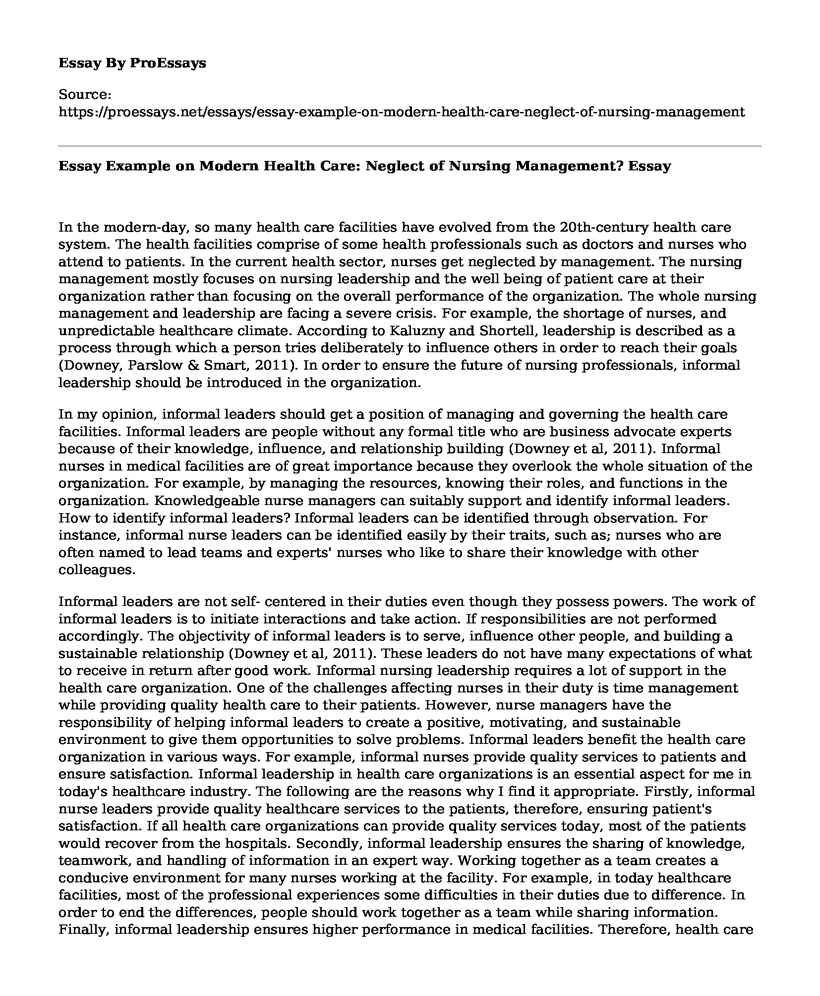In the modern-day, so many health care facilities have evolved from the 20th-century health care system. The health facilities comprise of some health professionals such as doctors and nurses who attend to patients. In the current health sector, nurses get neglected by management. The nursing management mostly focuses on nursing leadership and the well being of patient care at their organization rather than focusing on the overall performance of the organization. The whole nursing management and leadership are facing a severe crisis. For example, the shortage of nurses, and unpredictable healthcare climate. According to Kaluzny and Shortell, leadership is described as a process through which a person tries deliberately to influence others in order to reach their goals (Downey, Parslow & Smart, 2011). In order to ensure the future of nursing professionals, informal leadership should be introduced in the organization.
In my opinion, informal leaders should get a position of managing and governing the health care facilities. Informal leaders are people without any formal title who are business advocate experts because of their knowledge, influence, and relationship building (Downey et al, 2011). Informal nurses in medical facilities are of great importance because they overlook the whole situation of the organization. For example, by managing the resources, knowing their roles, and functions in the organization. Knowledgeable nurse managers can suitably support and identify informal leaders. How to identify informal leaders? Informal leaders can be identified through observation. For instance, informal nurse leaders can be identified easily by their traits, such as; nurses who are often named to lead teams and experts' nurses who like to share their knowledge with other colleagues.
Informal leaders are not self- centered in their duties even though they possess powers. The work of informal leaders is to initiate interactions and take action. If responsibilities are not performed accordingly. The objectivity of informal leaders is to serve, influence other people, and building a sustainable relationship (Downey et al, 2011). These leaders do not have many expectations of what to receive in return after good work. Informal nursing leadership requires a lot of support in the health care organization. One of the challenges affecting nurses in their duty is time management while providing quality health care to their patients. However, nurse managers have the responsibility of helping informal leaders to create a positive, motivating, and sustainable environment to give them opportunities to solve problems. Informal leaders benefit the health care organization in various ways. For example, informal nurses provide quality services to patients and ensure satisfaction. Informal leadership in health care organizations is an essential aspect for me in today's healthcare industry. The following are the reasons why I find it appropriate. Firstly, informal nurse leaders provide quality healthcare services to the patients, therefore, ensuring patient's satisfaction. If all health care organizations can provide quality services today, most of the patients would recover from the hospitals. Secondly, informal leadership ensures the sharing of knowledge, teamwork, and handling of information in an expert way. Working together as a team creates a conducive environment for many nurses working at the facility. For example, in today healthcare facilities, most of the professional experiences some difficulties in their duties due to difference. In order to end the differences, people should work together as a team while sharing information. Finally, informal leadership ensures higher performance in medical facilities. Therefore, health care managers in today's health care industries should ensure that the facilities are managed and monitored by experts.
Conclusion
To sum up, Informal nursing leadership is of great significance to health care organizations. The introduction of this system in health organization has ensured that the nurses are not neglected. The leaders are chosen according to their knowledge, ability to associate with one another well, and good records. These leaders are responsible for ensuring the organization provides better services to the patients. The leaders are responsible for managing the resources of the organization.
Reference
Downey, M., Parslow, S., & Smart, M. (2011). The hidden treasure in nursing leadership: Informal leaders. Journal of nursing management, 19(4), 517-521.
Cite this page
Essay Example on Modern Health Care: Neglect of Nursing Management?. (2023, May 08). Retrieved from https://proessays.net/essays/essay-example-on-modern-health-care-neglect-of-nursing-management
If you are the original author of this essay and no longer wish to have it published on the ProEssays website, please click below to request its removal:
- The Connection Between Anemia and the Intestinal Conditions
- Role of the Nutrition Manager Essay
- Research Paper on Quantitative Nursing
- Cultivating Healthful Environments in Nursing Essay Example
- Expository Essay on Ethical and Legal Issues in Healthcare
- Research Paper on School Meals in Early Childhood: Planting the Seeds of Sustainability
- Black Death: The Mightiest Catastrophe in History - Essay Sample







